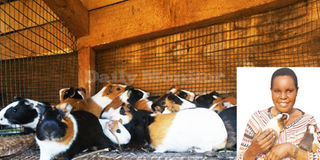Rearing guinea pigs makes Namulindwa a rich farmer

Judith Namulindwa (inset) started with only two guinea pigs. Today they are in hundreds. PHOTO/PHIONAH NASSANGA
What you need to know:
- When you think of guinea pigs you might think of cute, cuddly little pets. But for Judith Namulindwa a resident of Katela Wakiso District, rearing guinea pigs means earning an extra income.
On about eight by seven square metres Judith Namulindwa rears rabbits, quills, white rats and pekin ducks. It is among these that she also rears the guinea pigs, a venture she has managed for the last six years.
Guinea pigs belong to the rodent family, they are bigger than rats yet smaller then rabbits.
These are with short limbs, large heads and eyes, short ears and tailless. Seeing them for the first time you might mistake them for rats, but different people have different names for them, in Congo farmers call them dende, the Bakonzo from southwest Uganda call them Busonga yet the Lugbara from West Nile call them Bambu and are kept for meat which is high in proteins and low in calories
“I started rearing guinea pigs in 2016, after a one Amos Mugisa Akiiki interested me in them. I know much about them but during one of my visits to his farm I came across them and he was willing to teach me everything about them and most importantly the market,” she narrates.
She travelled to Kasese with Mugisa where she bought her first breeds and this was because Mugisa’s guinea pigs had been bought off.
“When I went to Kasese I bought one pair of guinea pigs, one male and other female at Shs80,000 and by the end of the year I had about 100 guinea pigs,” says Namulindwa.
Raising and housing
Namulindwa says unlike other animals, raising guinea pigs is easy, they reproduce quickly and at every birth you expect a mother to produce three to four pups and by the end of the year you are most likely to have 200 more guinea pigs. According to Namulindwa there are different types of guinea, but good breeds you need to look out for these with a short nose, hair and a large head.
“Guinea pigs with such characteristics gain weight fast and reproduce easily,” she says.
Noting that guinea pigs can be housed in well ventilated wire-sided cages made out of small wire mesh and wood. A cage that is 70 cm by 90 cm by 40 cm high can hold six of them. She says to prevent them from eating the wood in the cage, you can cover it with dry grass.
“Guinea pigs are afraid of loud noises, and when frightened they may climb on top of each other thus getting hurt. That is you need to house them in a quiet place.”
Diet and breeding
Feeding guinea pigs is cheap since they are herbivores that feed on green leaves, vegetables, and grasses. But to supplement their food you can give them pelleted rabbit feeds which are rich in vitamin C. She says when hungry they will make a low wheeking sound, the same sound is made when they sense danger, but this time loud enough to keep you awake.
“Guinea pigs can start breeding at one month, but it is advisable for the females to make three months and males for two to four months. When fully grown the breed is high. Pregnancy lasts for about two months and females give birth between three to four babies,” she explains.
Newborn guinea pigs can be nursed for three weeks before the introduction of food supplements. When weaned these are separated from their mother to avoid mating with other guinea pigs in their enclosure.
Common health problems
Guinea pigs can develop dental problems. Their teeth grow at a rate of 2 to 3mm per week, so they need to be constantly chewing on something: Overgrown teeth can lead to weight loss, severe pain, and discomfort. Because of the fur on their bodies they are vulnerable to ticks and once attacked they will experience hair loss and itching. She says small as they are, you may need a veterinary doctor to check on them every three months.
Sometimes they also suffer swollen footpads, which come as a result of them stepping on hard surfaces. But to avoid that you apply soft material such as grass for them to walk on.
Market
According to Namulindwa guinea pigs are multi-purpose animals and are used for different purposes such as food, pets and scientific experiments.
She says her biggest market is among foreigners who buy them for meat. “The guinea pig meat is high in protein, low in fat and cholesterol, which makes it healthy for consumption,” she explains.
Revealing that these are also bought as pets since they are easy to manage and harmless.
They either bite or scratch. She says the other big market is among schools and laboratories, who buy them for scientific experiments especially when they cannot find the white mice that are of required size. One guinea pig is sold at Shs80,000 and a pair is at Shs70,000.
“Rearing guinea pigs is one of the lucrative businesses you can invest in because it is cheap to start, manage and can be run on a small piece of land.
Easy to rear
Raising guinea pigs is easy, they reproduce quickly and at every birth you expect a mother to produce three to four pups and by the end of the year you are most likely to have 200 more guinea pigs.




